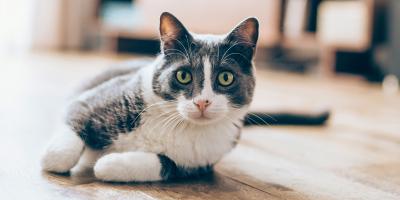Cat Anxiety: Signs, Symptoms & Treatment


You might associate cat anxiety with fireworks and other loud noises (and for felines who fear water – baths). While these things can be scary, cats can develop fears for other reasons as well.
Understanding anxiety in cats can be challenging, however, as the signs aren’t always obvious. After all, they can’t simply tell you how they’re feeling. Instead, you need to decode their behavior.
Read on to learn more about the causes of cat anxiety, symptoms, and tips on how to calm an anxious cat.
Can Cats Have Anxiety?
Yes, cats can have anxiety. Their nervous feelings often manifest in compulsive or bad behavior. It’s important to note when they started acting differently as the timing can help you identify the causes and develop treatment options.
What Are Cats Scared Of?
A nervous cat may react to both external and internal, or psychological, triggers. Some common causes of cat anxiety might be:
- Loud noises (including, but not limited to, hairdryers, vacuum cleaners and lawnmowers)
- New people or pets added to the family
- Special events, such as parties, fireworks or sports games
- Changes to their environment or routine
- Water
If you’re asking, Why are cats scared of everything?, it’s possible that skittish cats have not been socialized well as kittens.
There’s a window of time when felines are young during which they’re receptive to new experiences and sensations. If their exposure is limited, it can result in fearful behavior later in life.
In addition to a lack of socialization, cat anxiety can stem from trauma. For example, if your feline was once attacked by a dog, they may now have negative feelings towards dogs. Traumatized cat symptoms can include territorial aggression, among other things.
Pro tip: When you adopt a cat, try to learn as much as possible about their history so you can avoid putting them in stressful, anxiety-inducing situations.
Signs of Anxiety in Cats
If you’re wondering, Does my cat have anxiety?, look for signs. Symptoms of anxiety are often demonstrated through unwanted behavior in your home. You may see increased scratching of furniture, spraying and territorial litter box behavior.
But acting badly isn’t the only sign your cat feels anxious. They may also develop compulsive behaviors that they repeat over and over.
These are concerning as they can lead to unintentionally bad outcomes. For example, if your cat overgrooms, they may develop bald patches in their fur.
Other cat anxiety symptoms may include:
- Change in mood for no apparent reason
- Hiding
- Refusing to use the litter box
- Aggression
- Following people around the house
- Increased vocalization (excessive meowing)
- Excessive grooming
- A change in appetite or weight Increased lethargy
- Vomiting
Sometimes signs of anxiety in cats may actually be the result of illness. If your pet starts to seem anxious, contact your veterinarian so they can rule out underlying medical conditions.
Can Cats Have Panic Attacks?
There isn’t a veterinary medical term for panic attacks in cats, but felines can experience severe anxiety. Symptoms of severe anxiety in a panicking cat can include freezing in place, fleeing, aggression and dilated pupils.
Cat Separation Anxiety
Cat separation anxiety occurs when your feline companion feels fearful in the absence of familiar people or pets in your home.
It can occur in any breed of cat under any circumstances, although it may be more common with cats who experienced abuse or have been rehomed.
Cat separation anxiety symptoms can include:
- Your cat compulsively follows you from room to room
- Acting out while you get ready to leave the house
- Destructive behavior such as scratching and eliminating outside the litter box
Can Cats Have Separation Anxiety – Quiz
Take our quiz to find out if your cat’s behavior may be a sign of separation anxiety.
- Which option best describes your cat’s behavior when you’re not home?
- No signs of anything unusual
- Destructive actions such as excessive vocalization, going to the bathroom outside the litter box, or scratching the furniture
- How does your cat react when you’re getting ready to leave your home?
- Seems calm or unconcerned
- Meows a lot, starts following me or otherwise seems distressed
- Have you recently started a new job or begun spending less time at home?
- No
- Yes
- Have there been any changes to your cat’s environment, such as a move or introduction of a new family member or pet?
- No
- Yes
- How does your cat react when you come home?
- A brief greeting, and may or may not follow me around temporarily
- Unusual level of excitement and won’t leave my side
- Was your cat ever rehomed?
- No or not sure
- Yes
- Does your cat act clingy and follow you around at home?
- No
- Yes
If you answered ‘b’ to one or more of these quiz questions, your cat may have separation anxiety. Talk to your veterinarian about a diagnosis and treatment plan.
Are Cats Afraid of Fireworks?
Many cats don’t like fireworks. The loud cracking sounds can make felines (and other animals) anxious. They may hide under a bed or in a closet until the noise is over.
Cat Anxiety Treatment
If you’re wondering how to reduce cat anxiety (including separation anxiety), here are some common treatments.
Establish a Routine
Your cat may find comfort in knowing when to expect you to leave and return every day.
Provide Enough Stimulation
Whether it’s through a puzzle feeder, toys or a scratching post, make sure your cat gets physical and mental stimulation. This can help keep them calm.
Separate at Home
To minimize separation anxiety, limit your cat’s access to you at home. Options may be closing the door to the room you’re in, and putting them in their crate at certain times of the day as a routine.
Make Leaving Low-Key
Don’t make a fuss when you leave the house. Giving your cat lots of attention when you go can reinforce the fact that you’re separating from them. You can perhaps offer them a cat treat to create a positive association with you leaving the home.
Play Soothing Music for Cats While You’re Gone
Calm, soothing music playing throughout the home may help relax your cat in your absence.
Try a Calming Supplement
A calming care anxiety supplement may help reduce cortisol (a biomarker of stress) in your cat and help them cope with changes to their routine. (Check with your veterinarian before giving your pet a supplement.)
Consider a Cat Pheromone Diffuser
A cat pheromone diffuser emits a synthetic version of a cat’s natural pheromones, which may help calm your pet. They can be most effective for cats with mild anxiety. Also note – not all felines are affected by them.
Ask About Cat Anxiety Medication
If your feline has severe anxiety or their nervous behavior isn’t reduced through nonmedical interventions, talk to your veterinarian to rule out underlying illness as the possible cause of their behavior. If it is confirmed that your cat has anxiety, ask your veterinarian if cat anxiety medication is appropriate.
For event-based fears such as fireworks on Independence Day, short-term antianxiety medication may be useful. Longer-term antidepressants for cats are also available to help your pet cope with other forms of anxiety.
Cats with anxiety may be afraid of noises, changes to their environment, or being separated from familiar companions. Past trauma can also create fear and nervousness. If your pet is engaging in destructive or compulsive behavior, try to identify the triggers and talk to your veterinarian about potential treatment options.
Want more tips on caring for your feline companion? Explore our other cat health articles.

Earn myPurina Rewards with Every Purchase
Use your points for treats, toys, and gift cards with myPurina app.






